Israel, Germany Discuss Iran Nuclear Talks
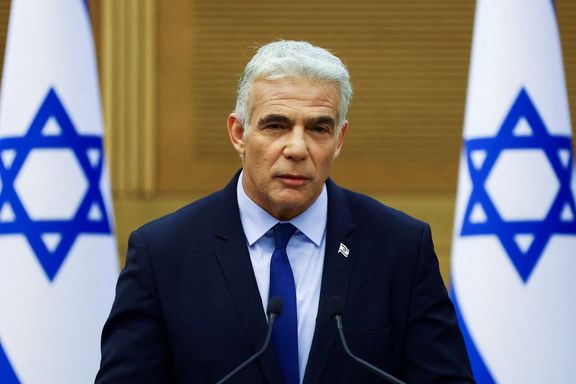
Israeli Prime Minister Yair Lapid and German Chancellor Olaf Scholz discussed the Iran nuclear talks, reiterating that Tehran should not be able to drag out the Vienna negotiations.

Israeli Prime Minister Yair Lapid and German Chancellor Olaf Scholz discussed the Iran nuclear talks, reiterating that Tehran should not be able to drag out the Vienna negotiations.
Stressing that Iran cannot be allowed to endlessly buy time in Vienna, Lapid expressed Israel’s firm opposition to a return to the deal, adding that it was crucial for the E3 — Germany, France, and the UK — to send a clear message that they would make no further concessions to Iran during the talks.
Earlier in the day, Iranian Foreign Minister Hossein Amir-Abdollahian held a phone call with his Omani counterpart Sayyid Badr al Busaidi, in which he repeated that if Iran’s red lines are respected, a new phase will start in Vienna.
“We will enter a new stage in Vienna Talks once we receive the US response to Iran’s position [submitted to EU mediators on Monday]، if we're assured that we'll reap economic benefits of the JCPOA and our red lines are met," he said.
Referring to Oman’s constructive role during the negotiations, Amir-Abdollahian thanked Doha's efforts to bring the views of different parties attending the negotiations closer.
According to IRNA, Oman's foreign minister also expressed hope that with the cooperation of all sides in Vienna, a satisfactory outcome will be reached.
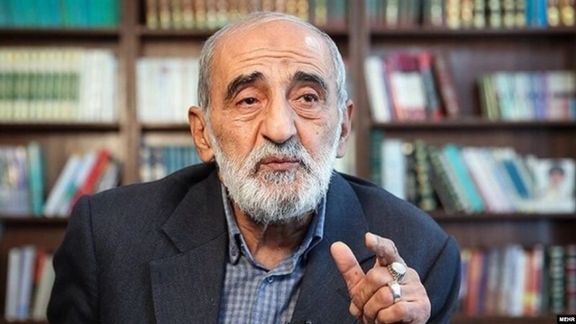
A top hardliner in Tehran says the only real guarantee for Iran in a nuclear agreement would be its right to withdraw from the NPT if the US abandons the deal.
Hossein Shariatmadari, the editor of the Kayhan daily, the flagship hardliner newspaper affiliated with the Supreme Leader Ali Khamenei argued on Thursday that no guarantee by the United States is worth the paper it is written on.
“I would dare to say that no guarantee from the United States is reliable” or valid Shariatmadari wrote, recounting the withdrawal of the Trump administration from the 2015 nuclear agreement, the JCPOA.
The ultra-hardliner editor is also Khamenei’s representative at the Kayhan.
As nuclear talks between Iran and the West have reached a critical stage, with the Biden administration reviewing the latest written Iranian response to a European Union text, some Khamenei loyalists continue to make more demands. But Shriatmadari’s article was re-published in most Iranian websites on Wednesday, even those considered to be “reformist’.
Shariatmadari, writing in his Editor’s Note, questioned the value of any US guarantee, a key demand by Iranian negotiators that is still preventing an agreement. Referring to the unilateral withdrawal of the Trump administration from the JCPOA, he said that Washington can again easily renege and abandon any new agreement.
He even fired a shot at foreign minister Hossein Amir-Abdollahian for saying that a US verbal guarantee should be presented in writing.
Shariatmadari dismissed this demand, saying that no US guarantee, even endorsed by the UN Security Council, can be trusted.
He argued that the only guarantee for Iran would be wording in the new agreement that it will withdraw from the Nuclear Non-Proliferation Treaty (NPT) if the United States once again abandons a restored JCPOA. He said Iran would be accountable to no one, not even the United Nations, if it decides to leave the NPT.
Leaving the non-proliferation agreement would mean no international monitoring of Iran’s nuclear activities, Shariatmadari said, assuring readers that there would be no consequence for Iran, as article 10 of the treaty allows signatories to withdraw from the agreement.
The Khamenei loyalist also demanded that all US sanctions should be verifiably lifted, not just those imposed since 2018 when former President Donald Trump exited the JCPOA. If sanctions imposed “under hostile and ad hoc labels such as human rights, regional presence or missile program” stay, then it means no sanctions have been removed and new ones can be imposed in the future, Shariatmadari argued.
Since the US presidential election in November 2020, and Biden’s announcement that he would return to the JCPOA, Iran has been demanding the removal of all sanctions, but Washington says it will not lift terrorism and other non-nuclear sanctions.
Iran’s negotiating team “has stood against excessive demands of the rival” so far, but they should “demand the removal of all sanctions in the upcoming agreement,” no matter what their label might be, Shariatmadari said. Otherwise, “Rest assured that practically no sanction can be considered lifted.”
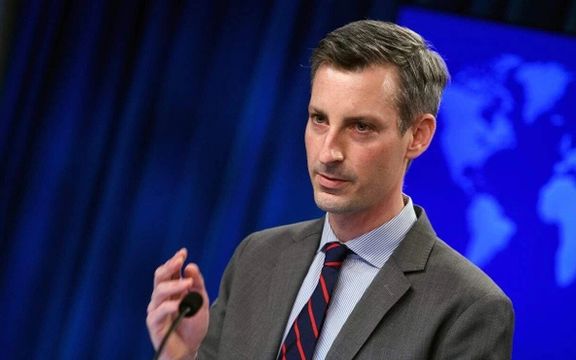
Washington is still studying Iran’s response Monday to European Union proposals to revive the 2015 nuclear deal, the State Department Spokesman said Wednesday.
“We are engaged in consultations with the EU, and with our European allies on the way ahead,” Ned Price told a press briefing. The spokesman gave no timeline for a United States input on the Iranian response, given in writing Monday after the EU mediator Enrique Mora on August 8 submitted what he called a “final text.”
“We look at this not through the lens of politics but of national security,” Price said, defending the Biden administration’s approach in the face of criticism from many in Congress.
“We are confident that a mutual return to compliance with the JCPOA [the 2015 nuclear deal, the Joint Comprehensive Plan of Action] remains the best, and really the most effective means by which to verify and permanently constrain Iran’s nuclear program,” Price said. “In the years in which we have not had a JCPOA, since May 2018, Iran’s nuclear program has galloped forward…”
Price said with “national security concerns” upmost, the Biden administration saw Congress “as a partner in this endeavor,” and had “routinely” updated lawmakers. “Our foreign policy is going to be much more effective if conducted with the full support of Congress.”
‘Guarantees’ and detainees
After meeting in closed session Wednesday for a briefing by leading officials, Iran parliament members appeared positive over the talks. But reports continue to suggest that Tehran is seeking ‘guarantees’ – both in terms of sanctions and over the readiness of its nuclear program – should the US again leave the JCPOA as it did in 2018 under President Donald Trump.
While Iran’s main concern might be the possible election of a Republican president in 2024, November’s mid-terms, which are deeply unpredictable given the flux of American politics, could see more JCPOA-critics elected.
Price also stressed the “priority” attached by the administration to the release of American-Iranians detained in Iran. Citing “what we have heard from Iran recently,” Price declined to comment on “the specifics” of contacts with Tehran over a potential prisoner swap, noting the US did not want to do “anything that could jeopardize, or slow…the release of Americans who are wrongfully detained in Iran.”
While both Iran and the US deny any link between a prisoner swap and the JCPOA talks, the Iranian Foreign Ministry Spokesman Nasser Kanaani said earlier Wednesday that Tehran was ready for an “immediate agreement” to secure the freedom of “innocent Iranians…[jailed] on false charges of violating the cruel and illegal sanctions of the United States…[so they could be] released and quickly return to their families.”
Price on Tuesday was among several US officials who reiterated the call for the release of Americans jailed in Iran, highlighting the case of Siamak Namazi on his 2,500th day in jail.

A key member of the centrist Executives of Construction Party in Iran has dismissed the value of a nuclear agreement, saying that peace comes out of a gun.
Some of the opinions expressed in an interview by Saeed Laylaz, an economic columnist turned politician, were so controversial that that the Etemad newspaper in a rare move had to distance itself from it and put a disclaimer saying, the opinions expressed were totally those of the interviewee and did not necessarily conform to the views of the daily's editors.
Laylaz said among other things that "Peace comes out of gun barrels, not out of agreements," and opined that "the know-how of making nuclear bombs is Iran's geopolitical shield." Meanwhile, he said that "all possible achievements of an agreement about the revival of the 2015 nuclear deal would be temporary."
Meanwhile, a prominent reformist politician, Former Deputy Foreign Minister Mohsen Aminzadeh told the daily's website, Etemad Online, that mainstream reformists in Iran disagree with Laylaz and believe in an agreement with the United States.
Laylaz said that the revival of the JCPOA in its current form is not in the interest of the Islamic Republic. "I hope the Iranian side refuses to sign the JCPOA," he said, adding that a temporary agreement is the best substitute for the JCPOA.
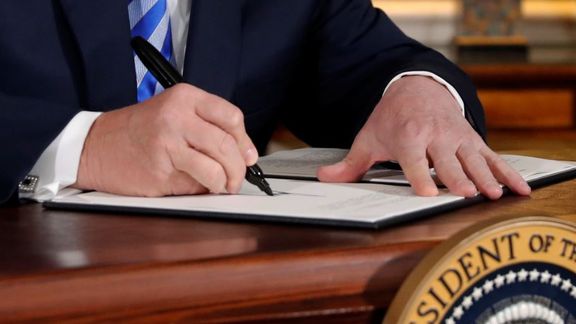
In one of the most controversial parts of the interview, Laylaz said that "Under the current circumstances an Iran capable of making nuclear bombs would be a safer country."
Meanwhile, expounding on the Islamic Republic's ongoing economic crisis, he said that good governance and a campaign against financial corruption will solve the country's problems. Laylaz attributed Iran's economic vows to mismanagement rather than the impact of US sanctions and said some of the cases of financial corruption in Iran are tantamount to outright theft. Laylaz attributed 80 percent of Iran's economic problems to financial corruption.
However, he acknowledged that former US President Donald Trump's withdrawal from the nuclear deal with Iran has had a devastating impact worse than the Mongol invasion of Persia. He added that even the current US administration is aware that the next administration will most certainly nullify any agreement with Iran.

Laylaz said Iran wants the agreement with the United States for two purposes: An economic purpose and a security purpose. But an agreement with the US will not serve any one of these two purposes. From an economic point of view, the West is not going to give any technology to Iran as long as Iran is a revolutionary Islamic country. He added: "In a country from where around $20 billions of capital exits every year, it is foolish to look for $2 billion dollars of foreign investment. We need to prevent the flight of capital from Iran."
Meanwhile, he argued that as soon as Iran signs an agreement with the West, the price of oil will come down, denying Iran any gain from a possible agreement. He added that even with an agreement, Iran's economic problems will reoccur within 6 months.
Laylaz also opined that in terms of security, an agreement will not solve Iran's problems because the West does not want a revolutionary Iran, while reaching a nuclear weapons capability will provide the deterrence Iran needs.
Asked what happens if Iran refuses to sign an agreement and its nuclear case goes to the UN Security Council? Laylaz said, "nothing will happen to Iran as long as Russia and China are UNSC member states. We should not be afraid of the trigger mechanism in the JCPOA. Let me tell you, this gun has no trigger. The United States has already tried everything against Iran, all in vain."
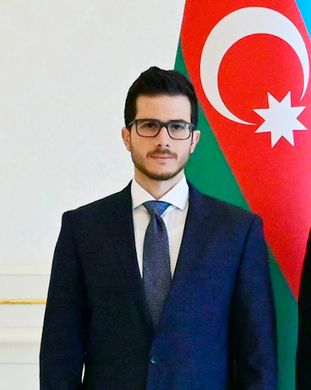
Following a quarrel between Iranian and Israeli envoys in Azerbaijan, the Israeli diplomat said the Islamic Republic has threatened him with death.
Israeli ambassador George Deek released a video on Tuesday, saying that Iran’s ambassador to Azerbaijan Abbas Mousavi recently threatened to kill him.
“He tweeted that I crossed a red line and that I would be buried by the people of Iran,” the Israeli envoy said, adding that “You can imagine my thoughts when I heard that author Salman Rushdie was stabbed before a speech; Iran also said that he had crossed a red line; Iran also threatened him with death. And the terrorist just tried to murder him in broad daylight.”
He added that “As someone who only weeks ago was directly threatened by an Iranian official, I urge you in the strongest possible terms: Take the threats of this murderous regime seriously.” “Don’t let them intimidate you, but do not dismiss them even for a single second.”
He referred to the Iranian threats to kill atheists, activists, and anyone who disagrees with them. “They threaten to spread terrorism throughout the world. They threaten to destroy Israel, democracy, and our freedom. They mean it; just ask Salman Rushdie,” he noted.
He called on the international community to make sure the attack on Rushdie was the last stabbing in the name of medieval hatred through confronting the Iranian terrorism.
Earlier on Tuesday, more than 250 Iranian public figures said in a statement that the United States must release details of the alleged ties between Rushdie’s attacker and the Islamic Republic.
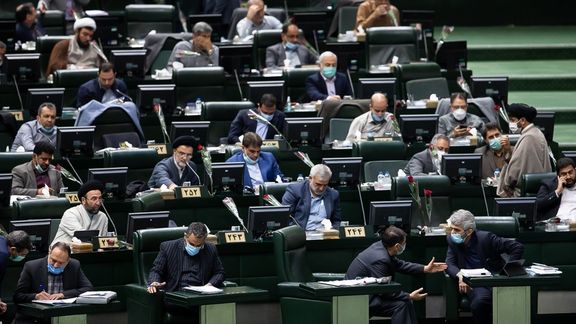
Iran’s parliament met Wednesday to hear from Foreign Minister Hossein Amir-Abdollahian and lead negotiator Ali Bagheri Kani on the nuclear talks.
Two years after hardliner-majority parliament, against the advice of then President Hassan Rouhani, passed legislation expanding the nuclear program and reducing cooperation with the International Atomic Energy Agency, there was general support for Iranian negotiators.
The official news agency quoted leading deputy Vali Esmaili that the parliament, convened in closed session, had no need to approve any terms agreed over restoring the 2015 Iran nuclear deal, the JCPOA (Joint Comprehensive Plan of Acton). “Full authority,” had been given to the negotiating team led by Bagheri Kani, said Esmaili.
Claiming victory on Wednesday Abolfazl Amuee, spokesman of the parliament’s foreign policy and security committee, said “the other side” had “accepted the Islamic Republic’s arguments on verification of lifting of sanctions and providing guarantees, and the essence of our country’s nuclear capabilities will be preserved.”
The Supreme National Security Council met Monday to approve Iran’s written response, given later that day, to a European Union text circulated August 8 as EU mediator Enrique Mora tried to conclude 16-months of talks between Iran and world powers aimed at reviving the JCPOA. The United States left the deal in 2018 and limits Iran began exceeding its nuclear limits in 2019.
SNSC secretary Ali Shamkhani appeared in parliament alongside Amir-Abdollahian and Bagheri Kani. He told parliament what had been achieved in the talks was built on the parliamentary legislation of 2020.
Esmaili urged the US and “the west” to “give the right answer to the package proposed by Iran.” A positive, if cautious response from the EU to the Iranian text, has encouraged hopes over JCPOA revival.
Steps to agreement ‘underway’
Vahid Jalalzadeh, head of parliament’s National Security Commission, said Iran was ready to agree once its interests were met, while Abbas Moghtadaei, another deputy, said steps towards agreement were “underway and negotiations have ended.”
The Iranian parliament approved the JCPOA back in 2015, despite the opposition of many members. While the number of deputies opposing, or critical of, the agreement has increased since then, the united front presented by Amir-Abdollahian and Bagheri Kani, both appointed by President Ebrahim Raisi, and the SNSC endorsement have shifted the mood.
Oil prices dropped Tuesday and Wednesday, partly as traders detected a more positive tone around the nuclear talks, which could release hundreds of thousands of barrels a day of Iranian oil from storage onto world markets. Under its ‘maximum pressure’ sanctions since 2018, the US has curbed Iran’s oil exports by threatening punitive action against buyers.
Positive assessment
With diplomats refusing to reveal details of the August 8 EU text or of the Iranian response, reports have offered differing explanations of what remains at issue. Iranian media and Mohammad Marandi, spokesman for the Iranian negotiators, said Tuesday that Tehran was still seeking guarantees it would be cushioned – both in terms of its economy and nuclear program – against any future US decision to again leave the agreement.
Defending the approach of the Biden administration Tuesday, State Department Spokesman Ned Price referred to “complex issues.” With vocal opposition in the US Congress to the JCPOA unabated, 250 Iranian activist outside Iran called Tuesday for breaking off diplomat contacts with Iran as a “terrorist-Islamic regime.”